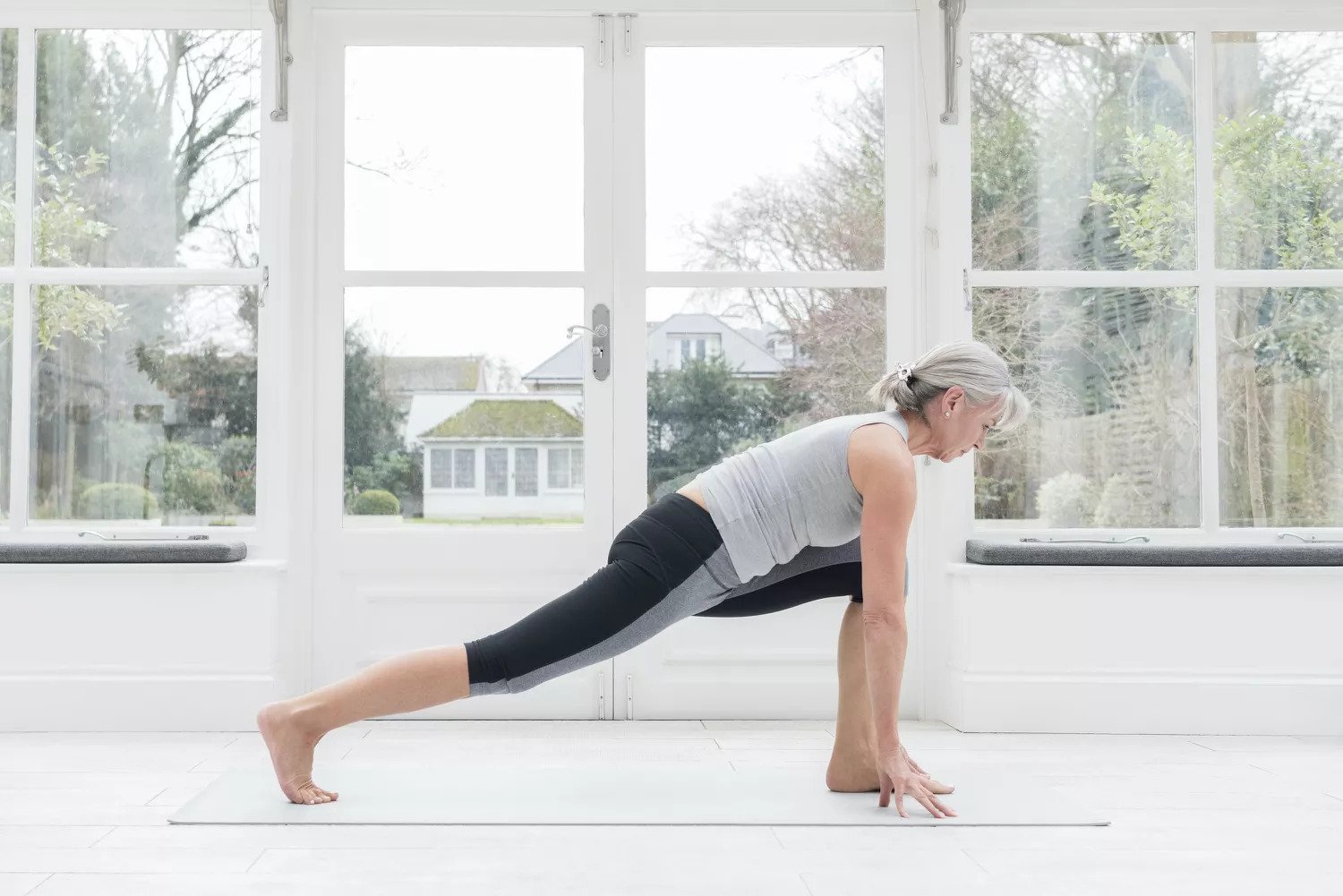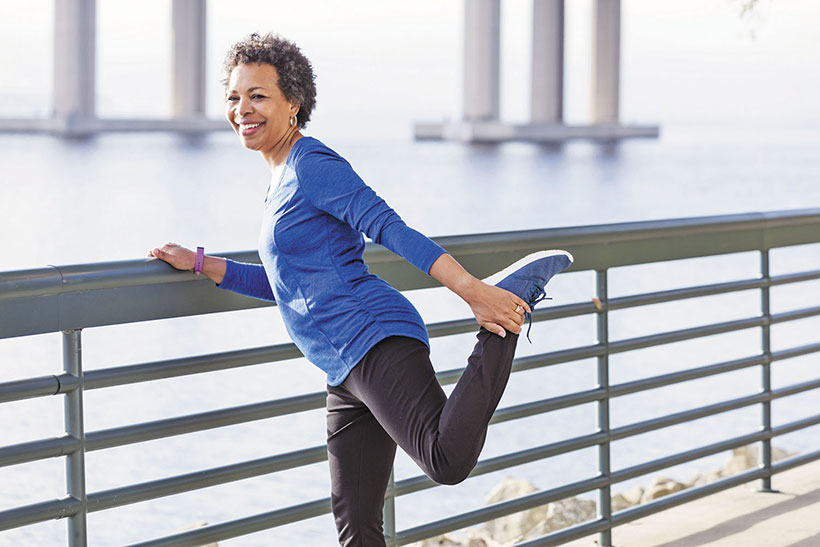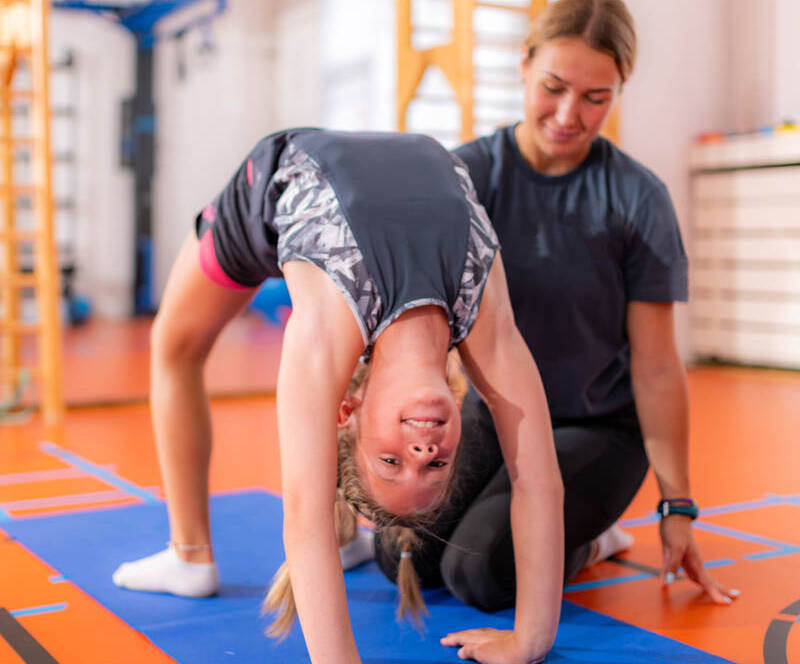As we age, many of us start feeling the strain of certain daily activities like standing up from sitting or getting out of bed. We tend to slow down the older we get — resulting in a loss of muscle strength and flexibility. Instead of tolerating the familiar aches and pains that come with movement and aging, incorporating a stretching routine will help mitigate those physical concerns. Our hips are an area that we want to keep limber to avoid stiffness or injury — and these are stretches that can assist with keeping our hips functioning and strong.
Benefits of Stretching
Older adults often experience limited mobility. One study on flexibility in older adults showed that in people aged 55 to 85, mobility in the hip and shoulder joint decreased by six degrees per decade.4 The study also showed that a significant decline in flexibility occurs after age 70.
Stretching can help improve flexibility. The American College of Sports Medicine (ACSM) recommends that most adults hold stretches for 10 to 30 seconds. The ACSM recommends older adults hold stretches for at least 60 seconds.5
This is because stretching helps reduce muscle tightness, which can shorten muscles and pull on the joints, making them less mobile. Additional research shows that the most effective exercise regimens for older adults incorporate stretching.6
Yoga has been shown to improve joint functionality in older adults, which improves their ability to walk and perform daily tasks with ease.7 Yoga is a great way to stretch because it can easily be adapted to suit different body types and abilities. Compared with strengthening exercises, which often require equipment, yoga is accessible and can be performed at home with simply a yoga mat.
When to See a Healthcare Provider
Under normal circumstances, stretches are safe to perform without supervision. But people with certain symptoms, including pain, inflammation, or decreased range of motion, should ask their practitioner whether stretches are safe and effective for them and about possible referral to physical therapy.
Low Lunge
A low lunge can stretch the quadricep and open the hip flexors, which can reduce hip tightness and increase range of motion in the hip joint.
To perform a low lunge, follow the steps below:
- Start in a tabletop position with hands and knees on the ground
- Bring your right leg forward, place the right foot flat on the floor, and align your right knee over your right ankle
- Press the top of the back foot into the ground
- Straighten your spine and lift your chest, then place your hands on the ground beside you
- Hold for at least 10 seconds and repeat on the other side
Stop if you feel sharp or stabbing pain or a tingling sensation.
Modification
A chair can make this stretch easier. Simply use the seat of the chair to support the front leg beneath the hamstring. You can also rest your arm or hand on the chair for added support.
Knee to Chest
This stretch helps loosen the psoas muscle, which is connected to the hips.
The steps include:
- Lie down on your back and bring one knee into your chest
- Wrap your arms around your knee
- Stay here or bring your knee across your body for a twist
- Hold for at least 10 seconds and repeat on the other side
Modification
Instead of bringing the knee all the way into the chest, bend the knee and place your foot flat on the ground.
Cobra Stretch
This is a gentle stretch that loosens the front of the hip flexors to boost mobility and decrease tightness throughout the hip region.
To perform this stretch:
- Lie on your belly on the floor or in your bed
- Bring both hands beneath your shoulders and gently press upwards
- Press up until you feel a stretch in your hips
- Stay here and breathe for at least 10 seconds
- Repeat as needed
Modification
Place a small rolled up towel beneath the hips and keep your forehead down on the bed. This will gently open up the low back and psoas muscle and encourage more mobility in the hips.
Figure Four Stretch
This stretch works the outer hip to improve the range of motion, which can help make other physical activities more accessible.
The steps of this stretch include:
- Lie down on your back on the floor or in your bed
- Bend the right knee and place the right foot flat on the ground
- Lift the left leg and place the left ankle over the right knee
- Gently engage the left leg to press the left knee away from the body
- Interlace your hands under your right hamstring
- Lift the right foot off the floor
- Hold and breathe for ten sections, then switch
Modification
Don’t bring your right knee up to your chest. Simply leave your right foot flat on the ground
A Word From Verywell
Hip stretching plays a vital role in helping you stay physically active as you age. A regular stretching regimen can reduce pain, improve mobility, decrease the risk of injury, and elevate overall quality of life. If you’re interested in hip stretching but struggle to perform these exercises correctly or without pain, talk to your healthcare provider about whether these stretches are right for you and if you need physical therapy to alleviate your hip discomfort.
If you are nervous about doing stretches correctly or want support starting a proper stretch routine, assisted stretching is a perfect solution! StretchFix is a team of professional Physical Therapists who genuinely care about helping you improve your mobility, flexibility, and peace of mind! Call us for more information or to book an appointment at 949-336-1089!








